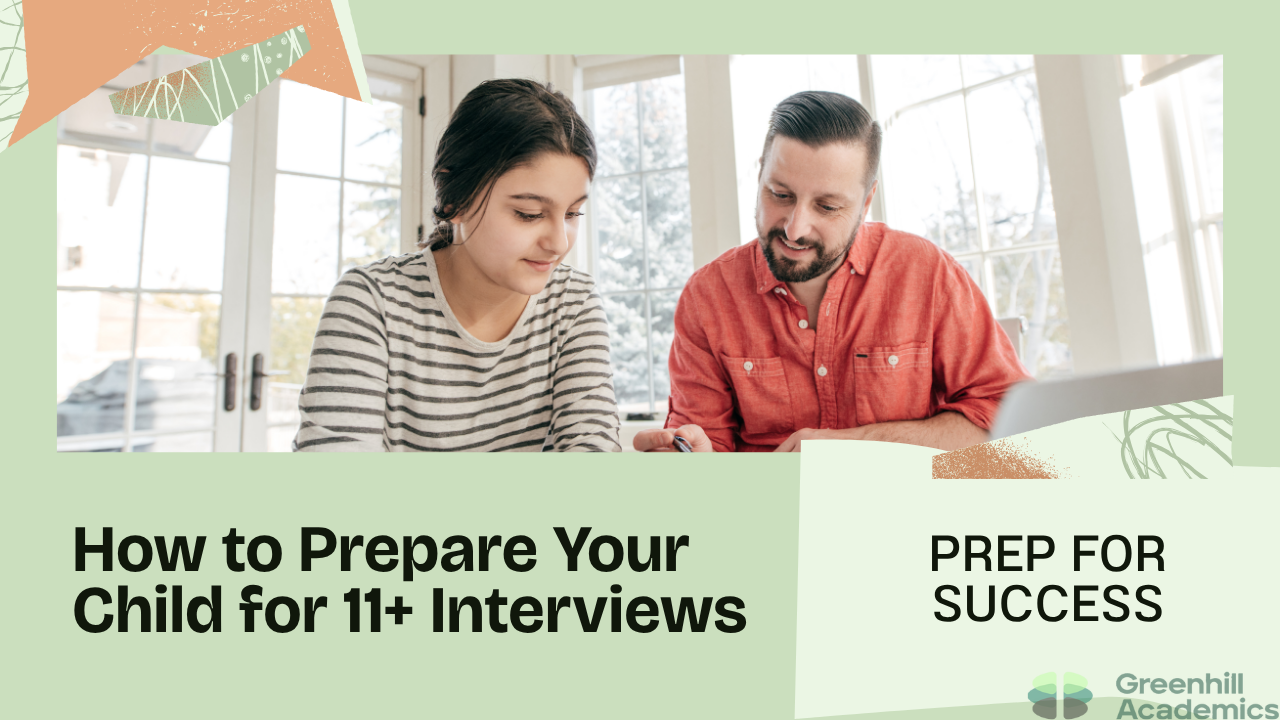You’ve just found out your child has an interview for a private school. Cue the slight panic. Are they going to freeze? Say something weird? Nod silently for 20 minutes while the teacher stares them down?
Let me stop you right there. These interviews aren’t meant to be intimidating. The school isn’t trying to trap your child or make them prove they’re the next Einstein. What they’re really hoping to see is… a child. A curious, thoughtful, chatty (or not-so-chatty) child who might be fun to teach.
Quick Guide: What to Expect in 11+ Interviews (Spoiler: It’s Pretty Normal!)
| Interview Component | Typical Questions | What They Want to See |
| Academic Interest | “What’s your favourite subject and why?” | Genuine curiosity about learning |
| Personal Character | “Tell me about a time you helped someone” | Kindness and empathy |
| School Fit | “What activities would you like to try here?” | Enthusiasm for school activities |
| Communication | “Describe a book you’ve enjoyed recently” | Clear expression of ideas |
What These Schools Actually Want
Look, I’ve spoken to loads of teachers from these places. They’ve seen every type of kid you can imagine, and they can smell fake enthusiasm from three miles away.
That child who gets genuinely excited talking about their pet lizard? Way more memorable than the one who drones on about “pursuing academic excellence” like some sort of tiny robot.
They want kids who seem… well, like kids. Happy ones who ask questions, who admit when they don’t know stuff, who might actually contribute something interesting to class discussions rather than just sitting there looking perfect.
How to Prepare Without Creating Pressure
Stop with the mock interviews. Seriously. Just stop.
Instead, start having proper conversations at home. You know when you ask “How was school?” and get “Fine” back? Try this instead: “What was the weirdest thing that happened today?” or “What made you laugh?” These questions get them thinking and explaining without it feeling like homework. That’s exactly what they need for interviews – the ability to reflect and chat naturally.
Read stuff together and talk about it like normal people. “God, that character was annoying, wasn’t he?” is infinitely better preparation than “What themes did the author explore?” Your child needs to practice having opinions and explaining them without sounding like they swallowed a textbook.
Get them talking to adults more. Not formal practice; just life. Let them order their own food sometimes. Get them to thank the delivery driver. These tiny interactions build confidence that makes interviews feel less alien.
Common Questions and How to Help
You don’t need to rehearse answers like a script. Schools are looking for real children who can think, reflect, and speak in their own words. Regular chats at home do more good than mock interviews.
If your child enjoys history, ask what draws them in. Is it the stories, the drama, or the strange facts? If they like science, maybe it’s the surprise of experiments or the satisfaction of solving problems. These kinds of details make answers feel honest and memorable.
When it comes to books, pick something they genuinely enjoyed. It doesn’t need to be impressive. A graphic novel or sports biography is fine. Help them explain why they liked it, even if it’s just a funny moment or a character they related to.
Explore the school’s website together. Look for clubs or subjects that spark curiosity. Even if they’ve never tried something like debating or drama, a real interest in giving it a go is what schools are hoping to see.
If they’re asked about handling disagreements, remind them it’s not about giving the perfect answer. It’s about showing they can stay calm and fair when things get tricky.
What to Avoid?
Over-coaching is a common mistake. When children sound too polished, it feels false. It’s better for them to speak naturally, even if they pause or stumble.
Putting pressure on the interview turns it into a test. That only adds stress. Keep the tone light. It’s just a conversation.
Achievements are great, but they aren’t everything. Schools want to know what your child genuinely enjoys, not just what looks good on paper.
And finally, don’t leave preparation too late. Good communication comes from everyday conversations. The more they practice talking to adults, the more confident they’ll become.
Interview Day: Keep It Simple
Start the day like any other. Let them eat their usual breakfast and wear clothes they already feel good in. Something smart is fine, but don’t dress them like they’re off to a wedding.
Arrive a little early, but not so early that you’re sitting around getting nervous. A short walk or a stop at a nearby café is a good way to keep things relaxed.
Before they go in, remind them of something important. These teachers have chosen to work with children because they actually enjoy their company. And if your child doesn’t know the answer to a question, it’s perfectly fine to say, “I don’t know, but I’d like to find out.” That honesty often impresses more than a guess.
How Our Tutors Build Interview Confidence
Some kids need extra support to feel comfortable chatting to adults. That’s completely normal! Not everyone’s a natural performer, and that’s fine.
Wynn gets this. He’s worked with confident kids who need to learn when to stop talking, and shy ones who need encouragement to start. His approach is about building genuine conversation skills, not interview performance.

Lucy understands that different children build confidence in different ways. She’s particularly good with anxious kids who need to understand that interviews are just teachers wanting to get to know them, not scary tests to pass or fail.

Experience the Greenhill Academics Difference
We’re not about teaching your child to say the “right” things in interviews. We help them become genuinely confident talking to adults about things that matter to them. That confidence shows up everywhere: in interviews, sure, but also in class discussions, with new teachers, when they need to ask for help. It’s a life skill, not just an interview trick.
What Families Say About Greenhill Academics
“We can’t thank you and Greenhill academics enough. Hayden had not been well enough to access education for three years, which was a huge loss to him. The tuition you provide for him and Alex is amazing. His lessons are his favourite time in his week.” – Katherine Susie Flanagan
“Excellent tutors, high quality tuition, and responsive admin. My son is not in school much due to health issues, and the English and Maths tutors are giving him a chance of getting GCSEs. He always seems more confident after a lesson. I highly recommend Greenhill Academic Consulting!” – Penny Joelson
“Skilled tutor who quickly built knowledge and confidence. Friendly and encouraging. A very positive experience. Would recommend.” – Katie Macdonald
Read more family success stories →
Look, if your child needs help feeling more confident talking, we can help with that. Book your free consultation today and see how our experienced tutors can help your child prepare effectively for interview success.
We also offer these Subjects
We offer these Levels
FAQs
My child lacks confidence—how will tutoring help?
Many students struggle with confidence, especially if they’ve had a bad experience in school or feel overwhelmed by the subject. Our tutoring approach helps students build confidence by breaking down difficult topics, reinforcing understanding, and celebrating progress.
My child is already working hard—why are they still struggling?
Studying isn’t just about memorising facts; your child must learn how to apply knowledge to unfamiliar contexts, especially in exams. Many students put in hours of revision but struggle with exam technique, structuring answers, or understanding mark schemes. A tutor can help identify and address these specific challenges.
How do I know if the tutoring is working?
We track progress through regular assessments, exam-style questions, and feedback from both the student and tutor. You’ll receive updates on improvements, areas of focus, and strategies for further progress.
Which exam boards do you cover?
We tutor for AQA, OCR, Edexcel, WJEC and CIE exam boards. We also cover the International Baccalaureate (IB)
How do online tutoring sessions work?
We set up a learning space which is joined at the time of a session. In the learning space, students are on video call with our tutors and use an interactive whiteboard with resources. Parents and students are often surprised how easy it is!
How often should my child have tutoring sessions?
This depends on their current level and goals. Some students benefit from weekly sessions for consistent progress, while others may prefer more intensive lessons closer to exams. We can recommend a schedule based on your child’s needs.
What if my child has a busy schedule?
We offer flexible scheduling, including evening and weekend sessions, to fit around your child’s commitments. Tutoring is designed to be productive and efficient, so even one hour a week can make a significant difference when supported with independent study.
Why are Greenhill Academics tutors considered the best you can find?
We select tutors with exceptional academic backgrounds, proven experience in helping students reach their goals, and in-depth knowledge of exam board requirements.
How do I get started?
Getting started is easy! Simply contact us to book a quick consultation, and we’ll select a tutor from our team who is the best match for your child
